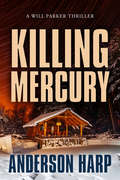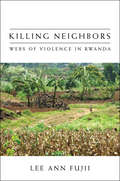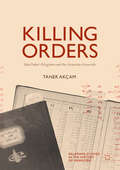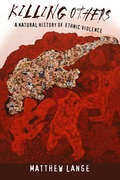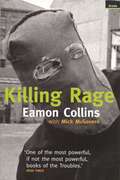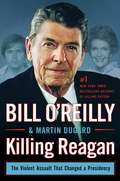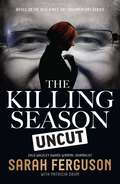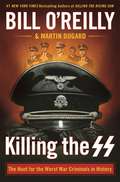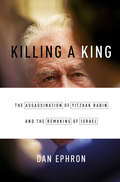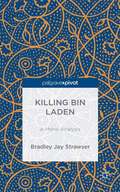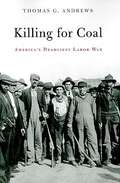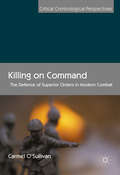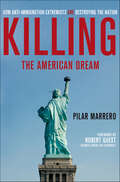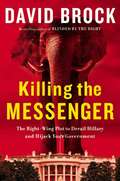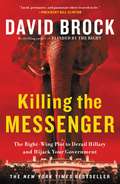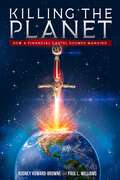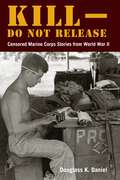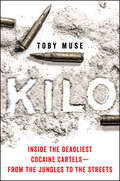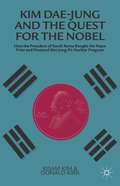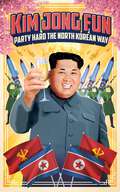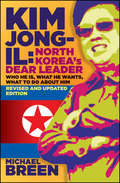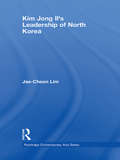- Table View
- List View
Killing Mercury (A Will Parker Thriller #5)
by Anderson HarpCODE RED Decorated Marine lieutenant colonel and small-town Georgia D.A. Will Parker has nothing to do with the outgoing U.S. President or his administration, including the secret service. And that&’s the way he wants to keep it. But Will&’s about to get in deep, whether he likes it or not. With two terms behind him, President Prisock Jordan is leaving the White House. And his daughter, Elizabeth, a student at Harvard, couldn&’t be happier. She&’s even planned a ski trip in hopes of ditching her secret-service detail, which calls her by a code name: Mercury. But a terrorist has different ideas. Injured in the president&’s last drone strike on the outskirts of a Yemen city, Hamza Bin Laden is on Mercury&’s trail—with the help of social media and a Russian hacker. When a Marine major and confidante of Elizabeth&’s learns that Hamza may be in the U.S., he fears for her life. With Elizabeth suddenly incommunicado, he requisitions an F-16 and flies to Georgia to beg for help—discreet help—from a reluctant Will Parker. But with a shocking turn of events, the threat level quickly skyrockets, forcing Will to deal with a secret service who won&’t listen to him. For only Will has the clues to Mercury&’s true location. And when a terrorist cell murders a group of college students in a remote cabin, it&’s up to Will and one bright and brave survivor to make their way across treacherous, foreign terrain to get to Mercury—before Hamza does . . . Praise for RETRIBUTION &“Tense and authentic—reading this book is like living a real life mission.&”—Lee Child &“I seldom come across a thriller as authentic and well?written as Retribution. Andy Harp brings his considerable military expertise to a global plot that&’s exciting, timely, and believable . . . to say that I&’m impressed is an understatement.&” —David Morrell, New York Times bestselling author of The Protector &“Retribution is a stunner: a blow to the gut and shot of adrenaline. Here is a novel written with authentic authority and bears shocking relevance to the dangers of today. It reminds me of Tom Clancy at his finest.&” —James Rollins, New York Times bestselling author of Bloodline &“Outstanding thriller with vivid characters, breakneck pacing, and suspense enough for even the most demanding reader. Harp writes with complete authenticity and a tremendous depth of military knowledge. A fantastic read—don&’t miss it!&” —Douglas Preston, #1 bestselling author of Impact
Killing Mercury (A Will Parker Thriller #5)
by Anderson HarpCODE RED Decorated Marine lieutenant colonel and small-town Georgia D.A. Will Parker has nothing to do with the outgoing U.S. President or his administration, including the secret service. And that&’s the way he wants to keep it. But Will&’s about to get in deep, whether he likes it or not. With two terms behind him, President Prisock Jordan is leaving the White House. And his daughter, Elizabeth, a student at Harvard, couldn&’t be happier. She&’s even planned a ski trip in hopes of ditching her secret-service detail, which calls her by a code name: Mercury. But a terrorist has different ideas. Injured in the president&’s last drone strike on the outskirts of a Yemen city, Hamza Bin Laden is on Mercury&’s trail—with the help of social media and a Russian hacker. When a Marine major and confidante of Elizabeth&’s learns that Hamza may be in the U.S., he fears for her life. With Elizabeth suddenly incommunicado, he requisitions an F-16 and flies to Georgia to beg for help—discreet help—from a reluctant Will Parker. But with a shocking turn of events, the threat level quickly skyrockets, forcing Will to deal with a secret service who won&’t listen to him. For only Will has the clues to Mercury&’s true location. And when a terrorist cell murders a group of college students in a remote cabin, it&’s up to Will and one bright and brave survivor to make their way across treacherous, foreign terrain to get to Mercury—before Hamza does . . . Praise for RETRIBUTION &“Tense and authentic—reading this book is like living a real life mission.&”—Lee Child &“I seldom come across a thriller as authentic and well?written as Retribution. Andy Harp brings his considerable military expertise to a global plot that&’s exciting, timely, and believable . . . to say that I&’m impressed is an understatement.&” —David Morrell, New York Times bestselling author of The Protector &“Retribution is a stunner: a blow to the gut and shot of adrenaline. Here is a novel written with authentic authority and bears shocking relevance to the dangers of today. It reminds me of Tom Clancy at his finest.&” —James Rollins, New York Times bestselling author of Bloodline &“Outstanding thriller with vivid characters, breakneck pacing, and suspense enough for even the most demanding reader. Harp writes with complete authenticity and a tremendous depth of military knowledge. A fantastic read—don&’t miss it!&” —Douglas Preston, #1 bestselling author of Impact
Killing Neighbors: Webs of Violence in Rwanda
by Lee Ann FujiiIn the horrific events of the mid-1990s in Rwanda, tens of thousands of Hutu killed their Tutsi friends, neighbors, even family members. That ghastly violence has overshadowed a fact almost as noteworthy: that hundreds of thousands of Hutu killed no one. In a transformative revisiting of the motives behind and specific contexts surrounding the Rwandan genocide, Lee Ann Fujii focuses on individual actions rather than sweeping categories. Fujii argues that ethnic hatred and fear do not satisfactorily explain the mobilization of Rwandans one against another. Extensive interviews in Rwandan prisons and two rural communities from the basics for her claim that mass participation in the genocide was not the result of ethnic antagonisms. Rather, the social context of action was critical. Book jacket.
Killing Orders: Talat Pasha’s Telegrams and the Armenian Genocide (Palgrave Studies in the History of Genocide)
by Taner AkçamThe book represents an earthquake in genocide studies, particularly in the field of Armenian Genocide research. A unique feature of the Armenian Genocide has been the long-standing efforts of successive Turkish governments to deny its historicity and to hide the documentary evidencesurrounding it. This book provides a major clarification of the often blurred lines between facts and truth in regard to these events. The authenticity of the killing orders signed by Ottoman Interior Minister Talat Pasha and the memoirs of the Ottoman bureaucrat Naim Efendi have been two of the most contested topics in this regard. The denialist school has long argued that these documents and memoirs were all forgeries, produced by Armenians to further their claims. Taner Akçam provides the evidence to refute the basis of these claims and demonstrates clearly why the documents can be trusted as authentic, revealing the genocidal intent of the Ottoman-Turkish government towards its Armenian population. As such, this work removes a cornerstone from the denialist edifice, and further establishes the historicity of the Armenian Genocide.
Killing Others: A Natural History of Ethnic Violence
by Matthew LangeIn Killing Others, Matthew Lange explores why humans ruthlessly attack and kill people from other ethnic communities. Drawing on an array of cases from around the world and insight from a variety of disciplines, Lange provides a simple yet powerful explanation that pinpoints the influential role of modernity in the growing global prevalence of ethnic violence over the past two hundred years. He offers evidence that a modern ethnic mind-set is the ultimate and most influential cause of ethnic violence. Throughout most of human history, people perceived and valued small sets of known acquaintances and did not identify with ethnicities. Through education, state policy, and other means, modernity ultimately created broad ethnic consciousnesses that led to emotional prejudice, whereby people focus negative emotions on entire ethnic categories, and ethnic obligation, which pushes people to attack Others for the sake of their ethnicity. Modern social transformations also provided a variety of organizational resources that put these motives into action, thereby allowing ethnic violence to emerge as a modern menace. Yet modernity takes many forms and is not constant, and past trends in ethnic violence are presently transforming. Over the past seventy years, the earliest modernizers have transformed from champions of ethnic violence into leaders of intercommunal peace, and Killing Others offers evidence that the emergence of robust rights-based democracy—in combination with effective states and economic development—weakened the motives and resources that commonly promote ethnic violence.
Killing Rage
by Eamon Collins Mick McgovernSince the 1970s, people have been murdering their neighbors in Northern Ireland. This book is the true account of the small-town violence and terror which lies behind the headlines.
Killing Reagan: The Violent Assault That Changed a Presidency
by Bill O'Reilly Martin DugardFrom the bestselling team of Bill O'Reilly and Martin Dugard comes Killing Reagan, a page-turning epic account of the career of President Ronald Reagan that tells the vivid story of his rise to power -- and the forces of evil that conspired to bring him down.<P><P> Just two months into his presidency, Ronald Reagan lay near death after a gunman's bullet came within inches of his heart. His recovery was nothing short of remarkable -- or so it seemed. But Reagan was grievously injured, forcing him to encounter a challenge that few men ever face. Could he silently overcome his traumatic experience while at the same time carrying out the duties of the most powerful man in the world? <P> Told in the same riveting fashion as Killing Lincoln, Killing Kennedy, Killing Jesus, and Killing Patton, Killing Reagan reaches back to the golden days of Hollywood, where Reagan found both fame and heartbreak, up through the years in the California governor's mansion, and finally to the White House, where he presided over boom years and the fall of the Iron Curtain. But it was John Hinckley Jr.'s attack on him that precipitated President Reagan's most heroic actions. In Killing Reagan, O'Reilly and Dugard take readers behind the scenes, creating an unforgettable portrait of a great man operating in violent times.
Killing Season Uncut
by Sarah Ferguson Patricia DrumAustralians came to the ABC's The Killing Season in their droves, their fascination with the Rudd-Gillard struggle as unfinished as the saga itself.Rudd and Gillard dominate the drama as they strain to claim the narrative of Labor's years in power. The journey to screen for each of their interviews is telling in itself. Kevin Rudd gives his painful account of the period and recalled in vivid detail the events of losing the prime ministership. Julia Gillard is frank and unsparing of her colleagues.More than a hundred people were interviewed for The Killing Season—ministers, backbenchers, staffers, party officials, pollsters and public servants—recording their vivid accounts of the public and private events that made the Rudd and Gillard governments and then brought them undone. It is a damning portrait of a party at war with itself: the personal rivalries and the bitter defeats that have come to define the Rudd-Gillard era."The making of The Killing Season matched the drama on screen and that's a story we wanted to tell. And now we have a place for the episodes of rich material we could have put into a 5-part series." — Sarah Ferguson
Killing The SS: The Hunt for the Worst War Criminals in History (Bill O'Reilly's Killing Ser.)
by Bill O'Reilly Martin DugardConfronting Nazi evil is the subject of the latest installment in the mega-bestselling Killing series <P><P>As the true horrors of the Third Reich began to be exposed immediately after World War II, the Nazi war criminals who committed genocide went on the run. A few were swiftly caught, including the notorious SS leader, Heinrich Himmler. Others, however, evaded capture through a sophisticated Nazi organization designed to hide them. Among those war criminals were Josef Mengele, the “Angel of Death” who performed hideous medical experiments at Auschwitz; Martin Bormann, Hitler’s brutal personal secretary; Klaus Barbie, the cruel "Butcher of Lyon"; and perhaps the most awful Nazi of all: Adolf Eichmann. <P><P>Killing the SS is the epic saga of the espionage and daring waged by self-styled "Nazi hunters." This determined and disparate group included a French husband and wife team, an American lawyer who served in the army on D-Day, a German prosecutor who had signed an oath to the Nazi Party, Israeli Mossad agents, and a death camp survivor. Over decades, these men and women scoured the world, tracking down the SS fugitives and bringing them to justice, which often meant death. <P><P>Written in the fast-paced style of the Killing series, Killing the SS will educate and stun the reader. <P><P>The final chapter is truly shocking.
Killing a King: The Assassination of Yitzhak Rabin and the Remaking of Israel
by Dan EphronA riveting story about the murder that changed a nation: the assassination of Israeli Prime Minister Yitzhak Rabin. The assassination of Israeli Prime Minister Yitzhak Rabin remains the single most consequential event in Israel's recent history, and one that fundamentally altered the trajectory for both Israel and the Palestinians. Killing a King relates the parallel stories of Rabin and his stalker, Yigal Amir, over the two years leading up to the assassination, as one of them planned political deals he hoped would lead to peace, and the other plotted murder. Dan Ephron, who reported from the Middle East for much of the past two decades, covered both the rally where Rabin was killed and the subsequent murder trial. He describes how Rabin, a former general who led the army in the Six-Day War of 1967, embraced his nemesis, Palestine Liberation Organization leader Yasser Arafat, and set about trying to resolve the twentieth century's most vexing conflict. He recounts in agonizing detail how extremists on both sides undermined the peace process with ghastly violence. And he reconstructs the relentless scheming of Amir, a twenty-five-year-old law student and Jewish extremist who believed that Rabin's peace effort amounted to a betrayal of Israel and the Jewish people. As Amir stalked Rabin over many months, the agency charged with safeguarding the Israeli leader missed key clues, overlooked intelligence reports, and then failed to protect him at the critical moment, exactly twenty years ago. It was the biggest security blunder in the agency's history. Through the prism of the assassination, much about Israel today comes into focus, from the paralysis in peacemaking to the fraught relationship between current Prime Minister Benjamin Netanyahu and President Barack Obama. Based on Israeli police reports, interviews, confessions, and the cooperation of both Rabin's and Amir's families, Killing a King is a tightly coiled narrative that reaches an inevitable, shattering conclusion. One can't help but wonder what Israel would look like today had Rabin lived.
Killing bin Laden: A Moral Analysis
by Bradley Jay StrawserKilling bin Laden: An Ethical Analysis is a short treatise on the possible ethical justification for the U. S. mission to kill Osama bin Laden. After rejecting the standard justifications most commonly used in support of the killing, Strawser ultimately argues that the killing was ethically permissible as an act of defensive harm on behalf of innocents. The book contends bin Laden was morally responsible for a collection of unjust threats such that he was liable to be killed. Moreover, the many unique features of the bin Laden case -such as the use of pre-emptive harm and the collective agency of al-Qaeda - do not defeat that liability. The monograph also includes discussions of the apparent violation of Pakistan's sovereignty and the morally dubious celebrations of bin Laden's death, among other morally relevant issues.
Killing for Coal
by Thomas G. AndrewsOn a spring morning in 1914, in the stark foothills of southern Colorado, members of the United Mine Workers of America clashed with guards employed by the Rockefeller family, and a state militia beholden to Coloradoâe(tm)s industrial barons. When the dust settled, nineteen men, women, and children among the minersâe(tm) families lay dead. The strikers had killed at least thirty men, destroyed six mines, and laid waste to two company towns. Killing for Coal offers a bold and original perspective on the 1914 Ludlow Massacre and the âeoeGreat Coalfield War. âe#157; In a sweeping story of transformation that begins in the coal beds and culminates with the deadliest strike in American history, Thomas Andrews illuminates the causes and consequences of the militancy that erupted in colliersâe(tm) strikes over the course of nearly half a century. He reveals a complex world shaped by the connected forces of land, labor, corporate industrialization, and workersâe(tm) resistance. Brilliantly conceived and written, this book takes the organic world as its starting point. The resulting elucidation of the coalfield wars goes far beyond traditional labor history. Considering issues of social and environmental justice in the context of an economy dependent on fossil fuel, Andrews makes a powerful case for rethinking the relationships that unite and divide workers, consumers, capitalists, and the natural world.
Killing for Coal: America's Deadliest Labor War
by Thomas G. AndrewsThis book offers a bold and original perspective on the 1914 Ludlow Massacre and the "Great Coalfield War."
Killing on Command
by Carmel O'SullivanThis book explores the unique social and environmental factors which influence soldiers to commit war crimes. With a focus on decision-making processes, this monograph provides a significant interdisciplinary analysis of how soldiers decide to follow the commands of their superior officers, even if that means acting illegally. Making the key distinction between normal civilian society and the shocking realities of war, the author facilitates the reader with a comprehensive understanding of what a front-line soldier faces in contemporary combat situations. Killing on Command presents the limits of the law in preventing the occurrence of war crimes. Realistic and practical measures for armed conflict, including the regulation and prevention of violence, and the just implementation of legal standards are all questioned and examined in depth. Given a current focus on the regulation of conduct in war, and the recent prosecution of soldiers, this book will be of particular interest to scholars in the fields of criminology and international relations, as well as policy-makers.
Killing the American Dream: How Anti-Immigration Extremists Are Destroying the Nation
by Pilar MarreroAs the US deports record numbers of illegal immigrants and local and state governments scramble to pass laws resembling dystopian police states where anyone can be questioned and neighbors are encouraged to report on one another, violent anti-immigration rhetoric is growing across the nation. Against this tide of hysteria, Pilar Marrero reveals how damaging this rise in malice toward immigrants is not only to the individuals, but to our country as a whole. Marrero explores the rise in hate groups and violence targeting the foreign-born from the 1986 Immigration Act to the increasing legislative madness of laws like Arizona's SB1070 which allows law officers to demand documentation from any individual with "reasonable suspicion" of citizenship, essentially encouraging states and municipalities to form their own self-contained nation-states devoid of immigrants. Assessing the current status quo of immigration, Marrero reveals the economic drain these ardent anti-immigration policies have as they deplete the nation of an educated work force, undermine efforts to stabilize tax bases and social security, and turn the American Dream from a time honored hallmark of the nation into an unattainable fantasy for all immigrants of the present and future.
Killing the Messenger: The Right-Wing Plot to Derail Hillary and Hijack Your Government
by David BrockNew York Times bestselling author and founder of Media Matters, David Brock takes readers on his daring and eye-opening odyssey through the maze of political trenches.<P><P> David Brock is the ultimate happy warrior. Once a leading right-wing hit man, Brock is now the Left's pre-eminent defender and truth-teller. <P> In this incisive, personal account, Brock disarms the major tentacles of the Republican Leviathan: the Koch Brothers, the Clinton haters, and the Fox Noise Machine. With the acumen of a seasoned political player, Brock takes readers inside his Democratic war rooms and their 24/7 battles with right-wing forces for control of the story lines and messages that will decide the 2016 election. And he chronicles his own evolution from lead Clinton attack-dog to one of Hillary Clinton's fiercest defenders as he knocks down the conservative case against her.<P> Finally, KILLING THE MESSENGER provides the no holds barred playbook for what the new right-wing conspirators will do in this election cycle to tear apart the electorate-and what good, engaged, and informed citizens can do to stop them.
Killing the Messenger: The Right-Wing Plot to Derail Hillary and Hijack Your Government
by David BrockTHE NEW YORK TIMES BESTSELLERNew York Times bestselling author and founder of Media Matters, David Brock takes readers on his daring and eye-opening odyssey through the maze of political trenches. David Brock is the ultimate happy warrior. Once a leading right-wing hit man, Brock is now the Left's pre-eminent defender and truth-teller. In this incisive, personal account, Brock disarms the major tentacles of the Republican Leviathan: the Koch Brothers, the Clinton haters, and the Fox Noise Machine. With the acumen of a seasoned political player, Brock takes readers inside his Democratic war rooms and their 24/7 battles with right-wing forces for control of the story lines and messages that will decide the 2016 election. And he chronicles his own evolution from lead Clinton attack-dog to one of Hillary Clinton's fiercest defenders as he knocks down the conservative case against her. Finally, KILLING THE MESSENGER provides the no holds barred playbook for what the new right-wing conspirators will do in this election cycle to tear apart the electorate-and what good, engaged, and informed citizens can do to stop them.
Killing the Planet: How a Financial Cartel Doomed Mankind
by Paul L. Williams Rodney Howard-BrowneIn Killing the Planet: How A Financial Cartel Doomed Mankind, best-selling authors Rodney Howard-Browne and Paul L. Williams investigate the true motives and consequences of the Pilgrim Society.Early members of the Society included J. P. Morgan, Andrew Carnegie, Andrew Mellon, Cornelius Vanderbilt, Paul Warburg, Mortimer I. Schiff, Otto Kahn, and John D. Rockefeller. Although the Pilgrim Society and the powerful men involved are often praised for their philanthropic actions, Howard-Browne and Williams show that the Society was self-serving and subjected the American people to a brutal system of economic tyranny, one which is still in place today. As a sequel to The Killing of Uncle Sam, Killing the Planet is a thoroughly documented and impeccably researched book, with over 1,500 footnotes. It shows how mankind has become enslaved within the Luciferian world system that is managed and controlled by the world's wealthiest families. The book is not full of conspiracy theories but instead, unfortunately for all of humanity, full of gut-wrenching facts.
Kill–Do Not Release: Censored Marine Corps Stories from World War II (World War II: The Global, Human, and Ethical Dimension)
by Douglass K. Daniel“Fighter-Writer” reports from major battles in the Pacific highlight what America’s Marines endured in World War IIDouglass K. Daniel presents a fascinating trove of previously classified material withheld from the public because of government and public relations concerns at the time, including tactical details that could inadvertently aid the enemy, battlefield gore that could disturb readers, and the gamut of issues of taste. Navy censors in the field and editors at Marine Corps headquarters in Washington were also on alert for any material that could negatively affect the Corps itself or the overall war effort. Soul-searching stories that questioned the nature of war were rejected lest they sow doubt stateside about the cause for which so many lives were being lost.Behind the bylines was a new breed of storytellers. Considered “fighter-writers,” Marine combat correspondents, or CCs, carried typewriters as well as weapons. The Marine Corps Division of Public Relations recruited them from America’s newsrooms to join the fight that stretched from Guadalcanal and the bloody assault on Tarawa to the black sands of Iwo Jima and the dense jungles of Okinawa. Their approved work appeared in civilian newspapers, magazines, and other national and local media.This collection also highlights the unique efforts of the CCs and the public relations officers who commanded them. While they were assigned to report and write, they were Marines first. They eagerly put aside their notebooks to take up arms against the enemy as needed. Many were wounded in battle, and more than a dozen were killed, giving their lives to get the story behind the most significant conflict in human history.
Kilo: Inside the Deadliest Cocaine Cartels—From the Jungles to the Streets
by Toby MuseThis “compelling and unforgettable” account of Colombian drug cartels follows a kilo of cocaine from the field where it was farmed to America’s shores (Jon Lee Anderson, author of Che Guevara).Cocaine is glamour, sex and murder. A product that must be produced, distributed, and protected, it is both a harbinger of violence and a source of immense wealth. Beginning in the jungles and mountains of Colombia, it filters down to countryside villages, the nightclubs of the cities, and out across the globe. Each step in the life of a kilo reveals a different criminal underworld with its own players, rules, and dangers, ranging from the bizarre to the diabolical.Seasoned reporter Toby Muse has gained unprecedented access to the people who survive on these vast enterprises—from farmers, smugglers, and assassins to the drug lords themselves. Following a kilo of cocaine from its origins to its final destination, he reveals the human lives behind the drug’s complicated legacy. Piercing this veiled world, Kilo is a gripping portrait of a country struggling to end this deadly trade even as the riches flow. Uncovering stories of violence, sex, and money, it shows the allure and the madness of cocaine—and why the War on Drugs has been no match for it.Kilo includes sixteen pages of photographs.
Kim Dae-jung and the Quest for the Nobel
by Donald KirkThis book shows the relentless pursuit of the Nobel Peace Prize as the motive for bringing about the inter-Korean summit of June 2000 at a cost of hundreds of millions of dollars paid to North Korea's Kim Jong-il - funds used to finance missile and nuclear programs that threaten the region and the world.
Kim Jong-Fun: Party Hard the North Korean Way
by Kim Jong UnFor the baby-faced dictator in your life, a guide to throwing shindigs that go off like an intercontinental ballistic missile. 안녕하세요! Please express profound gratitude to Revered Marshall Kim Jong-un, who generously provides boundless wisdom to the people. In this book, he instructs his adoring subjects on how to party down in a one-party state. A good knees-up can lift workers' spirits, taking their minds off political repression, food scarcity and a total lack of free speech. Not that any of those are issues in North Korea, despite what Western propagandists might say. Kim Jong FUN is the #1 bestselling book in the DPRK! And, coincidentally, the only one you can buy.
Kim Jong-Fun: Party Hard the North Korean Way
by Kim Jong UnFor the baby-faced dictator in your life, a guide to throwing shindigs that go off like an intercontinental ballistic missile. 안녕하세요! Please express profound gratitude to Revered Marshall Kim Jong-un, who generously provides boundless wisdom to the people. In this book, he instructs his adoring subjects on how to party down in a one-party state. A good knees-up can lift workers' spirits, taking their minds off political repression, food scarcity and a total lack of free speech. Not that any of those are issues in North Korea, despite what Western propagandists might say. Kim Jong FUN is the #1 bestselling book in the DPRK! And, coincidentally, the only one you can buy.
Kim Jong-il
by Michael BreenAn expert on North Korea sheds new light on the enigmatic tyrant From his goose-stepping military parades to his clownish macho swagger, North Korea's Kim Jong-il is an odd amalgam of political cartoon and global menace. In charge of a nuclear arsenal he's threatened to use against the U. S. and Japan, the man, his motives, and the mechanisms of his absolute control over a country of twenty-three million people remains shrouded in mystery. In this second edition of his bestselling Kim Jong-il, Michael Breen, a leading expert on North Korea, dispels common myths and fallacies about the so-called "Dear Leader," while turning a spotlight on the man to reveal his true nature and the nature of his hold over a country ravaged by poverty and famine. Looks at Kim from a broad perspective, unlike most other books that cater exclusively to those interested in policymaking and international relations Features new information about succession plans, as well as the latest scoop on the mounting pressure among world leaders to thwart North Korea's nuclear ambitions Illustrated with rare photographs of Kim and his regime Highly accessible and suitable for anyone interested in learning more about North Korea, it's government, and its leader, Kim Jong-il unravels the mysteries, the myths, and the fallacies about the man in charge in ways that will entice even the harshest critics.
Kim Jong-il's Leadership of North Korea (Routledge Contemporary Asia Series)
by Jae-Cheon LimKim Jong Il came to power after the death of his father Kim Il Sung in 1994. Contrary to expectations, he has succeeded in maintaining enough political stability to remain in power. Kim Jong Il's Leadership of North Korea is an examination of how political power has been developed, transmitted from father to son, and now operates in North Korea Using a variety of original North Korean sources as well as South Korean materials Jae-Cheon Lim pieces together the ostensibly contradictory and inconsistent facts into a conceptual coherent framework. This book considers Kim and his leadership through an analytical framework. composed of four main elements: i) Kim as a leader of a totalitarian society; ii) as a politician; iii) as a Korean; and iv) as an individual person. This illuminating account of what constitutes power and how it is used makes an important contribution to the understanding of an opaque and difficult regime. It will be of interest for upper level undergraduate, postgraduates and academics interested in North Korean politics, and also those in Political theory.
